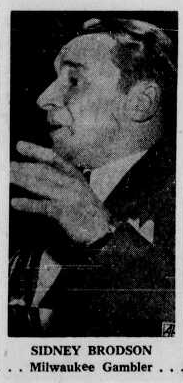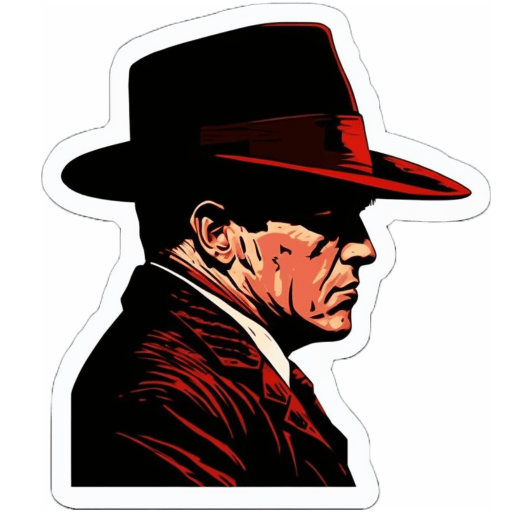Sidney Brodson
Sidney Albert Brodson (1908-1979) was born in Chicago to butcher shop owner Samuel Brodsky and his wife Rose. They lived at 1702 Milwaukee Avenue, in a building full of Russian Jewish immigrants involved in printing and tailor work. By 1920, they moved to a mixed Jewish-Italian neighborhood on Cicero Avenue and Samuel ran a cigar shop. By 1930, they had moved once more to a German-American neighborhood on Washington Boulevard, where Samuel had a grocery store. Early in life, Sid changed his last name from Brodsky to Brodson, perhaps to sound less Russian.
Between 1930 and 1940, Brodson married Marion Goldsmith, had a child, became an attorney and moved in with his wife’s family in Milwaukee, where father-in-law George Goldsmith was a real estate broker. Their home was located in a building that is now part of the UW-Milwaukee campus (and may have been at that time, too).
Around October 1941, Brodson incorporated the Regal Music Company, which was created to sell jukeboxes and vending machines. Officers in the business were Brodson, notorious fence Harold Klein, and Ruth Held. Klein was also mentioned in the “hot meat” Milwaukee Mafia episode.

Gambling
In the early 1940s, Brodson left his law practice and established a small office in Milwaukee, setting himself up as a “food broker.” With the help of a few assistants – primarily Teddy Gagliano (not to be confused with child trafficker Salvatore “Teddy Capp” Gagliano), he read as many as 100 newspapers per day for information which might have a bearing on the outcome of college football and basketball games.
Brodson frankly admitted to police and others he was placing bets with bookies or other gamblers in some twenty states to the amount of $1,000,000 per year, dealing almost exclusively over the telephone. He used three phones in his office, one of which was listed under the name, “Get the Vote Committee.” Long-distance telephone calls cost Brodson $15,000 yearly. After deducting such expenses as the cost of his newspapers and an athletic handicapping service somewhat comparable to the wire service in horse racing, known as Gorham Press, in St. Paul, Brodson earned ~$80,000 per year (that’s $851,043 in 2021 dollars) and by 1951 had amassed an admitted net worth of $250,000.
Brodson maintained a lengthy list of individuals throughout the country who could be called and who would either accept his bets or channel them to bookies who would. Brodson himself could be called by individuals who wished to bet and would accept their play. He did not consider himself a bookie, as he merely added the third party bets to his own.
Brodson had never met many of the individuals with whom he was betting daily but, through the mysterious grapevine of the gambling fraternity, was able to get in touch with them, determine their financial reliability and reputation as to paying off, and thus, participate in a veritable network of athletic betting on a nationwide basis. In addition to his knowledge that these individuals were betting with him, Brodson knew that they were betting with one another. In straightening out their accounts at agreed periods, Brodson and those with whom he bet exchanged checks or cash through the mail and used Western Union wires. He said that sometimes he received as much as $1,000 in cash through the mail and had won as much as $20,000 on a single bet.
The Milwaukee Police Department was aware that Brodson was gambling on a full-time basis and vigorously explored his activities, but was unable to establish that he made any bets with anyone in Wisconsin, thus avoiding prosecution at the local level. It seemed that Brodson had the correct legal answer to successful operation without fear of police interference without the necessity of arranging “protection” from the Mafia – if no state laws are broken, there’s no need to pay anyone off.
Kefauver Committee
On March 24, 1951, Brodson testified before the Kefauver Committee (officially the United States Senate Special Committee to Investigate Crime in Interstate Commerce) in Washington, DC, informing them that while he was licensed to practice law in Illinois and Wisconsin, he no longer did because gambling was more profitable. Brodson made the claim that he knew of five referees who were crooked and would affect the outcome of a game. He was not, however, involved in the New York basketball scandal where college players took bribes to miss some shots. (The CCNY point-shaving scandal is covered in a 1998 documentary called “City Dump,” and was the inspiration for the fictional 1951 film, “The Basketball Fix.”)
Brodson said, “My wife has always brought pressure on me to get out of this thing and perhaps I should have abided by her advice.” Brodson explained the “spread system” of basketball betting under which it is possible for a bookie to win both ends of bets on college basketball games if one team beats another by a score falling within the spread which may run from 2 to 7 points. Brodson readily conceded that this practice unquestionably contributed toward the corruption of college basketball players who could be talked into controlling the score of a game so that it ended within the spread and yet won the game for the school they represented.
When asked his advice on how Congress could address gambling, Brodson offered, “Obviously the American people want to gamble and you could search this room to find three people who have never gambled. And would you call the rest of the people gamblers? It is my firm conviction that legalization is the only solution.”
Brodson also had a financial interest in Brill Uniform and Browning-King, but said these paid him pennies compared to his gambling income.
The Brodson hearing was televised and A=an estimated 30 million Americans tuned in to watch the live proceedings in March 1951. As Brodson revealed the names, addresses and telephone numbers of individuals across the country with whom he placed bets, police officers viewing the televised proceedings learned for the first time of the gambling activities in their towns.
Arrests and Investigations
Police immediately visited the addresses mentioned and, before Brodson had left the stand, they had located and arrested his betting associates in cities separated by thousands of miles. Mayor Dorothy McCullough Lee of Portland advised that she would follow through further in the case of Irving Hasson, a bookie mentioned by Brodson. Hasson was arrested for bookmaking immediately following Brodson’s testimony. The mayor stated that she would revoke Hasson’s city licenses such as those for a card room or restaurant. In other localities, prosecutors learning of these telephone bookmaking activities directed the telephone companies to discontinue service to the bookmakers thus removing from them the instrument which is sine qua non of their activity. Named in Washington, DC was Nathan “Reds” Cohan, though Brodson said the bets were small, only about $1,000 at a time.
Within a week of Brodson’s testimony, investigations were launched by Big Ten commissioner Kenneth “Tug” Wilson and the Cook County state’s attorney, John Boyle. Brodson said he would give Wilson “ironclad proof” or “irregularities” from one basketball referee, and if any of the questionable games happened in Chicago, Boyle would prosecute. As near as I can tell, these investigations petered out and no one was charged.
Brodson’s Unpaid Taxes
Although he could not be arrested for gambling because his methods were technically legal, the government found another way to punish Brodson. In October 1951, the federal government requested Brodson pay $343,000 in back taxes, penalties and interest for the years 1945-1950, as he had not been reporting his gambling wins as income. The state of Wisconsin announced that they, too, were looking into Brodson’s tax delinquencies, and indeed shortly thereafter they sent him a $40,000 bill to be paid by November 18 (roughly two weeks) or face liens on his property.
In addition to the civil penalties the government had put on Brodson, the government added criminal charges of tax evasion for the same period in April 1953. Brodson posted his $5,000 bail to await trial from home. He pleaded not guilty on April 20, with Judge Robert Tehan setting trial for the earliest possible date.
While out on bail, Brodson continued to associate with known gamblers, most notably Joe Krasno – who had been probed during a wide-reaching 1948 John Doe examination of Milwaukee gambling. The hangout for Krasno, Brodson and others in the 1950s was the Casino Tavern on North Fifth Street.
Federal Judge Kenneth Grubb dismissed tax charges against Brodson on November 30, 1955, saying he government had violated his rights. His assets had been seized from the lien – including freezing his bank account — before an indictment was issued, putting him in a financial position where he couldn’t adequately defend himself. The court appointed him an attorney, but he argued (successfully) that he needed an accountant in order to sort out his taxes, which the government would not provide.
Throughout the 1950s, as the case went through various courtrooms, Brodson continued to gamble, placing bets with such trusted friends as bookie Bobby Pick, a Milwaukee gambler who had moved to Florida.
The prosecution appealed the decision to the appellate court in Chicago, with the appeal set to take place in September 1956. The case dragged on until August 1958, when a deal was reached where Brodson would plead guilty to one charge of tax evasion in exchange for the other charges being dropped. He did so, and Judge Grubb sentenced him to 18 months in prison and a $10,000 fine.
While serving time in Indiana, the Wisconsin state bar filed a complaint against Brodson, accusing him of activity that was unbecoming of an attorney. At the hearing, he was disbarred. The Madison newspapers ran a series of editorials in October 1960 criticizing the state bar; some lawyers, like Brodson, would get disbarred for tax offenses, while others with political connections could be convicted of tax crimes and merely get probation, continuing to practice law unimpeded.
Following his prison term and extensive fines, you might think that Brodson would give up gambling, get his law license reinstated and use his skills for something more above board. But you would be wrong, and we will return to Brodson’s degenerate gambling in a future podcast/article.
